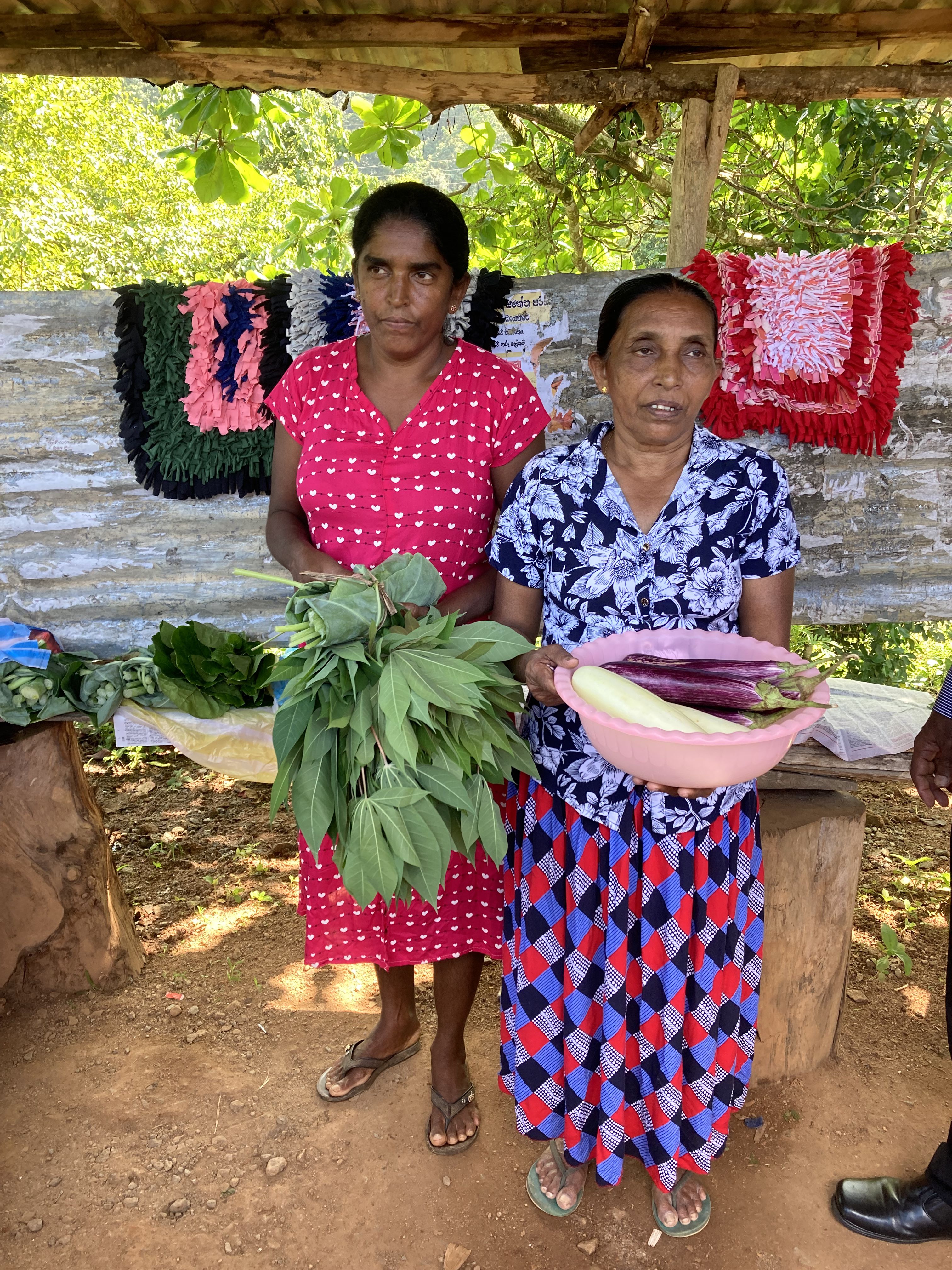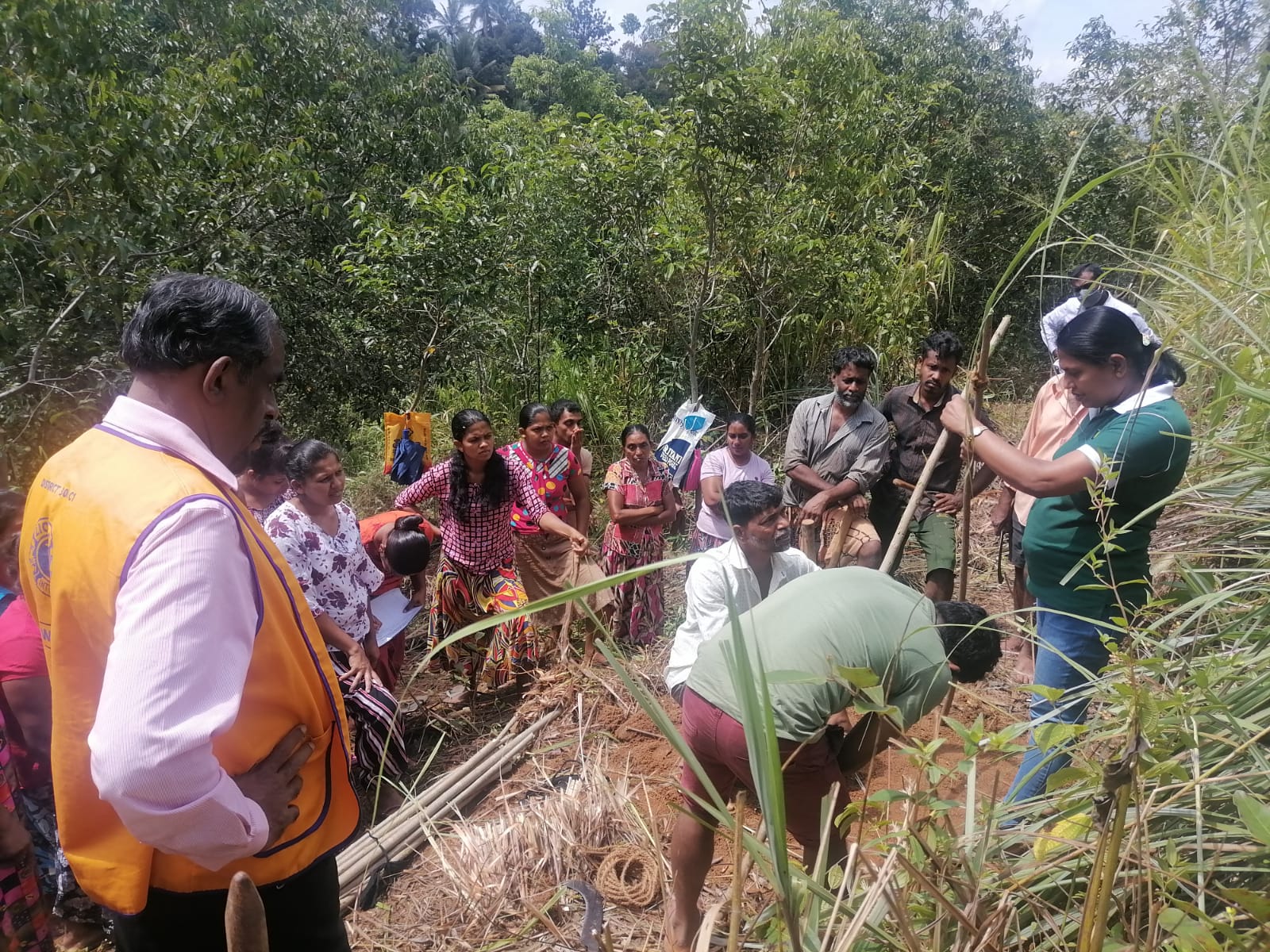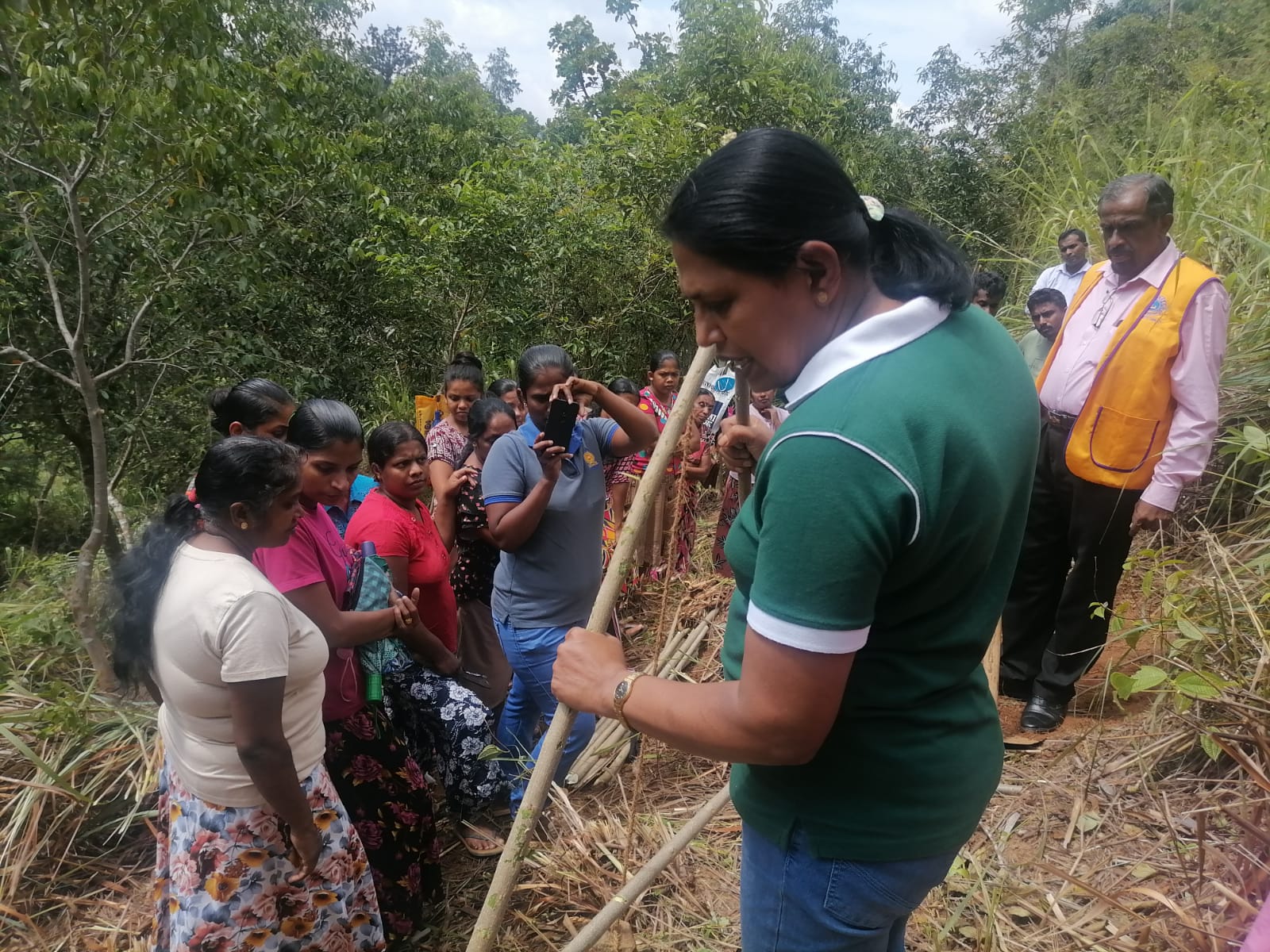The roads in the tea landscape of Sri Lanka twist along the contours of the hills, revealing one stunning view after the other. Should you find yourself on these beautiful roads on a Sunday morning, specifically in the Central Province, Kandy District, Welamboda Denuwara Education Zone, near the Gonadika Sinhala and Tamil Vidyalaya – a school based in a tea estate. You might in one of the road bends notice a small ‘pola’, a traditional farmers’ market where the locals sell their produce. Do stop your car and take a few minutes to look around – you will certainly find something useful! Perhaps a snack for your onwards travel, the one ingredient you are missing for dinner tonight, or a gift for your host in the form of a potted flower. There is a wide selection of vegetables, edible green leaves, fruits spices on offer here, from aubergines and bananas, to turmeric, chilis, and curry leaves.
 It will be a small gesture to do your shopping here, but one with immense implications for the women looking after the pola, who will meticulously write down your purchases and calculate the amount. More than twenty women have their goods displayed. The impact of your purchase will be clear as you read on.
It will be a small gesture to do your shopping here, but one with immense implications for the women looking after the pola, who will meticulously write down your purchases and calculate the amount. More than twenty women have their goods displayed. The impact of your purchase will be clear as you read on.
The produce comes from their little plots of land. It hasn’t travelled far - in fact, if you walk just ten minutes down the narrow gravel road adjacent to the road bend, you will find yourself on a ridge with small fields on either side, neatly divided into equally big squares of land. This is Gonadika Community Farm, run by the local community of village and estate workers. Well, the land does not actually belong to the farmers, it is owned by the State, and used to be covered by tea plants. Until 2022, this land had been kept barren for 30 years. But with the crisis of hyperinflation facing Sri Lanka, it was clear that something needed to be done for landless farmers in the poorer Estate Areas.
A frightening crisis
The situation in Sri Lanka has now, by November 2023, become acute. As Chaturanga Pradeep Samarawickrama from the Daily Mirror, Sri Lanka put it on November 4th: “Our people are suffering, and our children are starving.” Citing UNICEF, he continues, adding that Sri Lanka is now among the top ten countries with the highest number of malnourished children in the world - and the numbers are expected to rise further.
According to the Department of Census and Statistics, in the Estate Sector, tea and rubber workers receive an average monthly income of Rs. 46,865, with the poorest 20 per cent of households generating only Rs. 17,572, and the poorest 40 per cent Rs. 26,931. The income is less than Rs. 100,000 or more than what is needed every month for a family of four to provide three meals a day and cover children’s basic educational needs: uniforms, school bags, pens, pencils, exercise books, facility fees, transport charges, shoes and socks. This excludes the cost of house rent, medical needs, and electricity and water bills.[1]
Due to the hyperinflation families have lost 40 per cent of the value of their nominal incomes within just a year through May 2022 according to statistics published by the government itself. If you ask one of the women at the Gonadika Farm, she will tell you that she used to buy a food basket sufficient for a week for her family for Sri Lankan Rupee 500, whereas today she has to pay Sri Lanka Rupees 1,500 for the same amount of food.[2]
The explanations for rising food prices are many, ranging from the depreciation of the Sri Lankan rupee to bad weather conditions impacting harvests of some produce. However, as the Colombo-based policy think tank, Arutha, points out, the explanation is also to be found at the political level, where decisions to ease taxes on imported food stuffs from neighbour countries such as India and Pakistan are not being made[3]. Poor political decision-making power and the failure to add food to duty-free items under the free trade agreements with these countries, are thus keeping the people of Sri Lanka in a position of starvation due to unaffordability.
Food security through home gardens
The economic crisis in Sri Lanka started with the COVID-19 pandemic, where over 500,000 casual/temporary workers lost employment due to long-term and random lockdowns. Due to the financial crisis a majority of these workers remain semi or unemployed.[4] GWP Sri Lanka/Sri Lanka Water Partnership (SLWP), who had been involved in securing water, sanitation and hygiene (WASH) facilities in the area for more than a decade, started to witness schoolchildren dropping out of school and taking up casual labour jobs to support their parents. There is a fear of high early female dropouts from schools, due to girls being forced into early marriage by cash-strapped parents.
The unexpected food crisis and poverty faced by the villages persuaded the administration of Gonadika Tea Estate with the guidance of the Udunuwara District Secretariat and SLWP to take initial steps to utilise the available resources to address those challenges. Hence, the establishment of the Gonadika Farm was carried out to redress acute food shortages through support for short-term food security by promoting home gardens and backyard poultry. This also provided livelihood support through the purchases made at the pola.
Establishing the farm
 The estate community does not usually own land except for insignificant strips in the immediate surroundings of their homes in a 2 perch plot. The requests and reminders forwarded to the local government authorities by the community were an eye opener to the administration of Gonadika tea estate and the Udunuwara District Secretariat. Therefore they have agreed to allow short-term crops to be grown in 4 acres of abandoned tea land for two years. The allocated land was blocked out to 15 perch lands and distributed among 40 selected families and youth were given priority in land allocation. One-year agreements were signed with the respective farmers and those got to be renewed based on the activities undertaken in the plot, its production and owner’s cooperation with the rest of the farmers. The families and ten related officers and volunteers were given land use and home gardening training based on the tools developed and described in a booklet prepared by SLWP.
The estate community does not usually own land except for insignificant strips in the immediate surroundings of their homes in a 2 perch plot. The requests and reminders forwarded to the local government authorities by the community were an eye opener to the administration of Gonadika tea estate and the Udunuwara District Secretariat. Therefore they have agreed to allow short-term crops to be grown in 4 acres of abandoned tea land for two years. The allocated land was blocked out to 15 perch lands and distributed among 40 selected families and youth were given priority in land allocation. One-year agreements were signed with the respective farmers and those got to be renewed based on the activities undertaken in the plot, its production and owner’s cooperation with the rest of the farmers. The families and ten related officers and volunteers were given land use and home gardening training based on the tools developed and described in a booklet prepared by SLWP.
 The community selected a variety of vegetables for cultivation such as long beans, green chillies, local yams such as cassava/manioc and “Kiri Ala” and other cash crops such as passion fruit. They only use locally produced composts in the farm that produce fully organic harvest. They collectively contributed labour to dig an agro-well in the land. From the farm, they get a variety of healthy food in a shorter period. Planting materials including seeds were provided by the Divisional Secretariat Udu Nuwara, Kandy District.
The community selected a variety of vegetables for cultivation such as long beans, green chillies, local yams such as cassava/manioc and “Kiri Ala” and other cash crops such as passion fruit. They only use locally produced composts in the farm that produce fully organic harvest. They collectively contributed labour to dig an agro-well in the land. From the farm, they get a variety of healthy food in a shorter period. Planting materials including seeds were provided by the Divisional Secretariat Udu Nuwara, Kandy District.
The women group who was present on this day at the market was, Nilani, Anusha, Knanawathi, Jayani, Mallika, Sunethra, Renuka, Sewwandi, Nilusha, Nirosha, Nandawathi, Chandrika, Dammika, Saumya, Samanthi, Lasanthi and Chandima. While zipping a healthy porridge made of green leaves, we had a discussion with them.
“Can we get a fence with a mesh to cover the land area as wild bores often come and destroy the yams and parrots and monkeys come to eat the corn that we have planted”. Ms Nirosha another farmer woman said, “In addition to earning money, the farm supported us to fight hunger. On the other hand, the cassava harvest from my land is quite healthy, I was able to harvest more than 20 kilograms from my plot. I sold 1kg of cassava for 150 rupees”.
Mr H. G. Milton, the Chairman of the Rural Development Society of Mavikumbura-South highlighted “Now we must prepare for the upcoming drought period especially because we might run out of water for our crops. Can anyone support us to get a rainwater harvesting tank to get water to the farm? Knowing that the government is unable to fund us, we have also saved some money for this purpose”.
The output
Today, the women of Gonadika explain that the most important impact they feel from the farm is the money they save on food that they would otherwise have to buy from elsewhere. Second, the produce sold at the pola helps them pay for their children’s transportation to school. Third, it gives them hope for the future and a sense of accomplishment. Ms Mallika one of the farmer women said “I now pay the school bus fare of my children and paying the monthly contribution regularly to set up an irrigation system to the farm. I could do that because of the money I received by selling cassava, kiri ala and brinjal at the pola”. The women are now saving money together to invest in an irrigation system to pump water to the farm – which would makes their lives easier by not having to carry the water from the bottom of the hill.
Ms Samanthi, one of the plot owners informed that the farm keeps on contributing to the food security of the community. The women’s group organise cultural events such as Vesak Festival and New Year Celebration and other activities, Childrens Day Celebration and a food market collectively which make the group stronger.
Ensuring dignity through training in financial literacy
 You probably still have your receipt for the bananas you bought curled up in your pocket and forgotten all about it. Behind this seemingly insignificant little piece of work though, lies both a new-won pride and essential skill for the women of Gonadika, namely financial management skills.
You probably still have your receipt for the bananas you bought curled up in your pocket and forgotten all about it. Behind this seemingly insignificant little piece of work though, lies both a new-won pride and essential skill for the women of Gonadika, namely financial management skills.
Two sessions of training on financial literacy for community leaders were conducted for both the Parent Teacher Association of Gonadika school and for the farming community by a local bank, Hatton National Bank, a long-term partner of SLWP.
Nowadays, most members of the community are heavily in debt due to the financial crisis. All movable assets such as gold jewellery have been pawned or sold already. Therefore, this activity was introduced in the nature of debt coaching. The knowledge they received from the training has bolstered them to navigate and face the difficulties they now find themselves in with the financial crisis.
A vital partnership
This activity, benefiting a community of 40 families, is only possible because of a network built iteratively over the course of a decade. It has brought together farmers, mostly women and community leaders from the village, state officers from Divisional Secretariat Udu Nuwara, youth groups from Interact and Leos clubs, bankers – especially the Hatton National Bank, SLWP as co-financier and NetWwater as the social catalyst. It is built on long-term relationships with the community by NetWwater which enabled them to work around the social mobilisation costs usually incurred in setting up this type of activity.[5]
While this partnership was initially founded on a different issue, namely water challenges (WASH) in schools, water remains an essential element in the partnership. The link between water and food security is not a difficult one to see: both water and food security are basic human needs and irrigated agriculture is the predominant user of water worldwide. If water is essential to schools, it is even more essential to farmers and a necessity to grow the food that gives them a surplus to send their children to school in the first place.
[2] Female farmer at Gonadika farm, during field visit on October 29th, 2023.
[5] This activity would not have been possible had not the Soroptimists International of Malaysia offered to forgo part of the GWPO Gender Follow up grant earmarked for them, in favour of the Sri Lanka project. This kind gesture is very gratefully acknowledged.
